Book Festival Bookstore Is A Place of Discovery
Each year during the festival, a temporary bookstore is stocked just inside the main doors with dozens of selections, many of which are books with a Jewish theme or author.
Those who attend the Book Festival of the MJCCA in Dunwoody and head straight to the author events in the meeting rooms may miss an important encounter with the world of books in the lobby.
Each year during the festival, a temporary bookstore is stocked just inside the main doors with dozens of selections, many of which are books with a Jewish theme or author that is not on the festival schedule.
Quiet encounters with inspiring literature, like these books, have become increasingly rare in a world inhabited by instant e-book downloads and audio recordings that accompany us during the morning and evening rush hour.
For the two weeks of the festival, the MJCCA bookstore may just be the best Jewish bookstore in the city. It is a rich opportunity to find new titles, explore unfamiliar subjects, and seek out new literary voices.
It is what Jessica Handler, a successful author and head of the creative writing program at Oglethorpe University describes as hand-selling, what the book trade calls the personal interaction that occurs between someone browsing the bookstore and a clerk at the store who might suggest an interesting, new title. Perhaps it is a book that speaks in some special way to our personal experience, Handler suggests.
“I think when we read, we are sometimes trying to discover some aspect of ourselves. This is a story about myself or what I went through or what my best friend went through. Books create in us a wonderful sense of discovery.”
Although the stock of the bookstore is still being put together, there are several important books to look for, particularly those that deal with our self-discovery as Jews that have been high on many of the must-read lists of the American Jewish world.
There is Dani Shapiro’s beautifully written search for a new identity in “Inheritance,” a slim book, but an important one that explores how the author’s notion of who she believes herself to be is upset when she discovers at the age of 54 that the father she grew up with is not her biological parent. A Hollywood film adaptation is in the works.
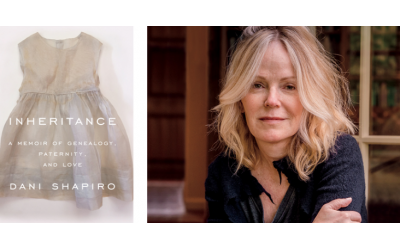
Shapiro is scheduled to speak about her book and its implication when she lectures at Temple Sinai in Sandy Springs Dec. 4.
Another provocative book is “We Stand Divided: The Rift Between American Jews and Israel” by an influential American-born Israeli social and political observer and National Jewish Book Award winner, Daniel Gordis.
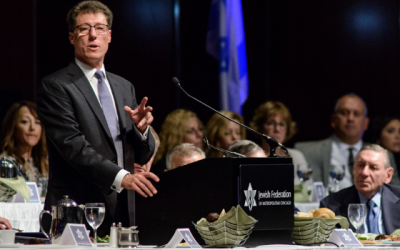
His plea for reconciliation between the world’s two largest Jewish communities has been described as “impassioned, brilliant and riveting.”
Also worth noting is “The New American Judaism,” Jack Werthheimer’s analysis of how we practice or in some cases don’t practice our religion in an era in which our beliefs are intensely personal. It’s about the changes that have come about in religious practice and notions in how we define ourselves spiritually.
For Eric Goldstein, who heads up the The Tam Institute for Jewish Studies at Emory University, Jews have a particularly troubling time defining their identity, religious or otherwise in America. His influential book, “The Price of Whiteness: Jews Race, and American Identity,” which was originally published in 2006, explores the difficult position Jews have occupied in a nation deeply divided over its attitudes on race.
He’s at work on a new volume, which he expects to publish next year on how books and reading shaped the lives of Jewish immigrants to America.
“Jews had a particular definition of becoming an American, which was different from other people. Books played a very important role because these immigrants understood that becoming an American meant becoming a person of substance, a person of education.”
That is almost as true today as it was 150 years ago. Although Jews make up less than 2 percent of the population, they are known as an important segment of the book buying public. The MJCCA Book Festival is one of about 120 organizations that make up the Jewish Book Council’s JBC Network.
Each spring it provides an important platform for over 250 authors to personally deliver a pitch limited to two minutes. For a fast-talking, well-spoken author, it can sometimes mean the difference between success and failure in the highly competitive book business, which in recent years has been dominated by Amazon’s online sales.
Changing patterns of distribution and the changing interests of consumers have been responsible for the decline or disappearance of traditional Jewish book publishers. The Hebrew Publishing Company is gone. Venerable names like Bloch Publishing, Jewish Lights, Schocken Books and even the prestigious Jewish Publication Society are only a shadow of their once powerful selves.
According to Emory’s Goldstein, the decline in strictly Jewish publishing houses is not all bad news.
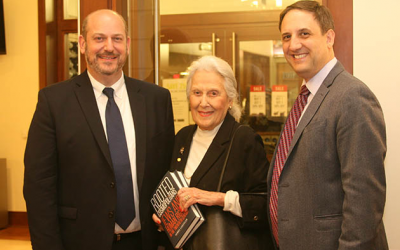
“Jewish books are now mainstream published by mainstream publishers,” he says. “Today, Jewish books go to Harvard University Press, or Oxford or Princeton. The fact is that Jewish topics and literature are of interest to everyone. Jewish culture is a part of the broader culture in a significant way.”
Goldstein doesn’t have much time for popular titles, but he has a couple of books he suggests festivalgoers might find in the bookshop.
The first is “Rooted Cosmopolitans: Jews and Human Rights in The Twentieth Century” by James Loeffler, a professor at the University of Virginia. It was the basis for last year’s Rothschild Lecture at Emory. He also recommends “A Rosenberg By Any Other Name: A History of Jewish Name Changing in America” by another professor, Kirsten Fermaglich.
The book is this year’s winner of the top prize given by the American Jewish Historical Society. It’s described as offering a previously unexplored window into American Jewish life. The author is a professor of Jewish studies, who is not Jewish.
This seems to indicate, perhaps, that how we define a Jewish book is changing, in Goldstein’s opinion.
“There can be a [specific] Jewish culture about how Jews participate in culture, but it is not specifically Jewish in content. I think it is tricky how we think about Jewish culture.”
The changing notion of Jewish culture makes events like the MJCCA, with its bookstore and festival book sales, particularly interesting to Handler. She’s been a regular attendee at the book festival for years and always makes time to pick over the titles in the lobby between speakers or on her way out the door.
Handler has spent plenty of time in bookstores this year, particularly in this part of the country, promoting her new best-selling and critically acclaimed novel, “The Magnetic Girl,” published last March.
She’s been to Parnassus Books in Nashville, Hub City in Spartanburg, and City Lights in Sylva, N.C., where one woman made a long trip over the mountains just to spend an hour with her and the promotional talk she gave one evening. Her personal favorite is Atlanta’s A Cappella Books in Inman Park, which staffs the MJCCA festival bookstore.
She still gets an occasional question about the book that launched her professional career 10 years ago, “Invisible Sisters.” It was a haunting memoir about how she and her family dealt with the death of her two younger sisters, who were struck down in their youth by illness.
Those deaths were particularly difficult for her father, a civil rights attorney who practiced labor law in the Jewish spirit of tikkun olam, bringing justice to the repair of the world.
“For my father, it was a particularly difficult question. How do you make the world a better place when you are struggling with your own emotions? How does a father achieve justice for others when he can’t save his own child’s life? That’s very much part of my Jewish identity.”
Each trip to a bookstore, even the temporary one at the MJCCA Book Festival, is a reminder to her of this continuing conversation about books and writing that are part of the privilege she has as an author.
In every one of the stores in which she speaks she always remembers to buy a book before she leaves. Not a bad idea, too, for those who visit the MJCCA during the next few weeks.



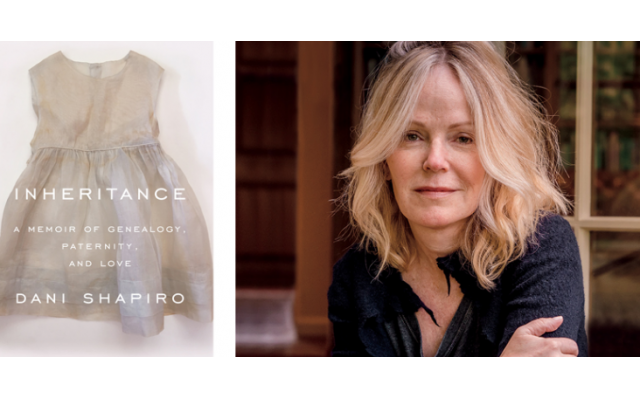
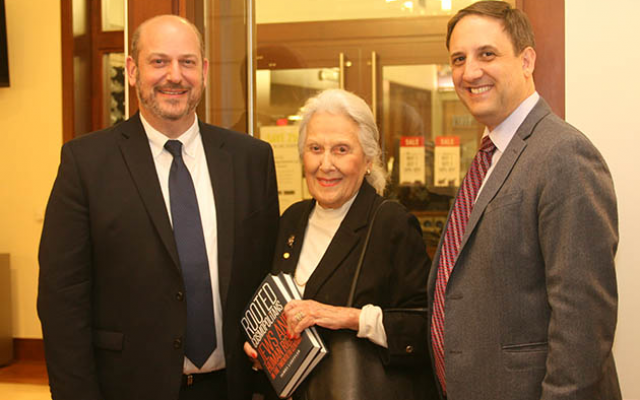
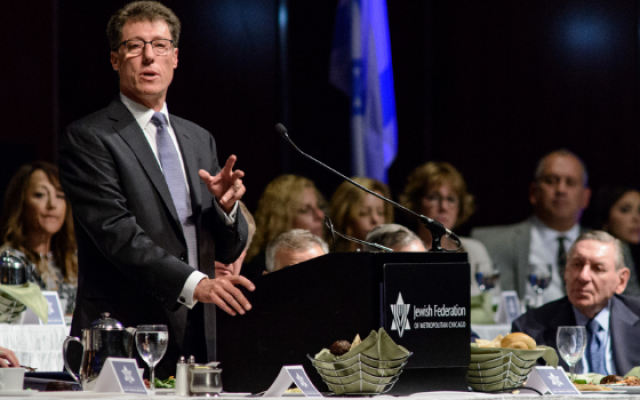
comments